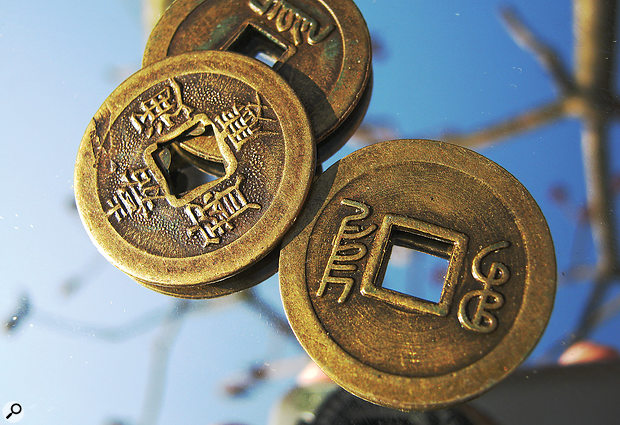When you use chance operations correctly, you end up challenging yourself constantly.
In the Summer of 1979 I was struggling to get going on my Masters thesis. I had to produce a composition and an analysis of the piece, and thinking ahead to the analysis before having done the composing had me stuck. Then I had an idea. For a while I had been in possession of a copy of the I Ching, the Chinese Book of Changes. I knew, as we all seemed to back then, that John Cage used the same book to compose his music. Was this the time for me to put it to use?
These thoughts were bubbling up as I was walking down a country road in the Laurentian Mountains. My brain was saying, "To use the I Ching, you'll need coins." My feet advanced two paces, and I almost stepped on a dime. My brain then said, "Wow — but you'll need three coins." My feet stepped two more paces, and I almost stepped on two more.
I still have those three dimes, and I have used them every time I have ever done the coin-tossing oracle of the I Ching. (Since 1984, I have mostly used software to simulate the same process.)
When you use chance operations you are asking questions. Chance provides the answers, so you don't have to worry about that. For example, you may ask, "How many bars should there be in the next verse?" You provide a range of possibilities, between four and 16, say. Then you ask the I Ching, and it gives you 11, for example.
You can't cherry pick the answers, you have to go with the answers chance provides. If you cheat, you're doing choice, not chance. This takes commitment.
Eleven bars for the next verse. Deal with it. How you deal with it is who you are.
When you use chance operations correctly, you end up challenging yourself constantly. Rather than doing what is conventional, or expected of you, or what you thought you wanted to do, you end up doing something you never expected. But weirdly — and this is where the magic lives — the music you write or produce turns out to be more like you than anything else you have ever produced. I can't explain why, but it has happened for me dozens of times.
When people set out to make music, the conventional wisdom is that they are expressing themselves. But these days, everybody is constantly expressing themselves, be it via politics, social media, what they consume, and so on. Everyone's noise is broadcast everywhere, and it influences everyone else's noise, all the time.
Chance operations are not about self-expression, but self-alteration. They are the antidote. They are an aid to growing yourself into actually being yourself, on your own terms, in your own time, in your own universe.
If you want to try it, get the book and three coins, and start asking questions. If you come to love it, go to https://anarchicharmony.org/IChing/ic.cfm, where you can run a version of the code written for Cage, at no cost to you — other than the risk of discovering who you really are.

